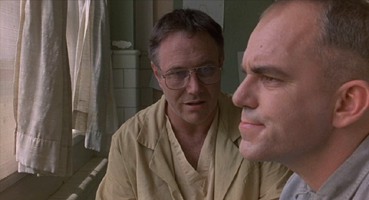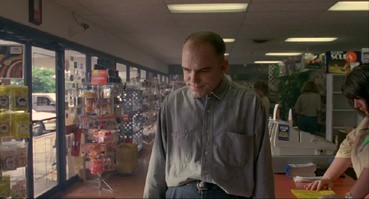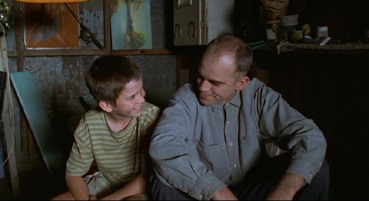NOTE:
For those poor unfortunates who have not seen the film,
proceed with caution,
as there are spoilers in this review.
Since
Billy Bob Thornton slowly made his way into household name
territory during the mid to late 1990's there has been much
retrospective praise concerning his first film as writer,
director and actor. Sling Blade was a big
hit on its arrival to the big screen and has lost nothing
in its translation to DVD. A strong auteur work, Sling
Blade stands out as not only Thornton's best work
as director to date, but also one of his very best acting
performances.

Karl
Childers (Thornton) is released from an Arkansas mental
hospital after 25 years of rehabilitation for murdering
his mother and her spiteful lover. The quiet and 'retarded'
Karl returns to his hometown and befriends a young boy (Lucas
Black) named Frank. He gets a job as a lawnmower repairman
at a local store and upon meeting Frank's mother, Linda,
Karl is invited to stay with them and her angry white trash
boyfriend, Doyle (Dwight Yoakam). Family friend and Linda's
boss, Vaughn (John Ritter), shares concerns about Frank
and his mother with Karl, and as a gay man in a small Southern
town, has an affinity with him as an outsider. Doyle becomes
progressively more of a threat to Linda and Frank's safety,
and Karl has to make the decision of whether or not to sacrifice
his freedom and soul for the well-being of his new found
family.
The
first thing that becomes apparent in watching Sling
Blade is the pace; slow, yet not leisurely. It
is considered, thoughtful, and with an undertone of menace.
Right from the start where J T Walsh unhurriedly and purposefully
drags his chair across the floor of the mental hospital
to come to rest next to Karl, there is an air of discomfort.
This is made full by the eerie tones generated by Daniel
Lanois' score, completing a sense of southern dread, as
Walsh half-whispers his unsettling tale to the jaw-jutting
silent and contorted face of Thorntons Karl.
It
is worth pointing out that at this time we are not sure
which one Karl is, and as he is being discussed across the
way by the manager of the hospital and a couple of girls
getting a scoop for their High School paper, the audience
is forced to wonder if the monster they speak of is the
vocal or silent character. As Karl is called out for the
interview, Walsh stops his biographical story and, slowly
but very surely, Karl rises and exits the room. Here the
kineticism of the scene expands to the character movement,
and Karl inhabits every aspect of the film. This is completed
when we hear the man talk. Deep, considered and constant,
without being monotone. There is a brief example of this
as he is asked to do the interview, but the real impact
hits you with the stunning monologue Thornton gives about
his crime. This is seven minutes of pure genius that I could
never tire of. Thornton likes long takes, and this scene
is a prime example. The camera stays with Karl throughout
the monologue, only cutting when his crime has been disclosed.
This makes for uncomfortable viewing, but Thornton's compelling
performance makes it an experience to watch. The set up
in this sequence mirrors the cinematography, lit simply
by one lamp, you could be watching theatre. Indeed, Thornton
first performed the monologue on the stage as part of a
one-man show. The entire film is shot very simply, with
many master shots and long takes. Thornton makes a point
of directing as an actor. He likes to give room for his
primary craft to flourish, so long, wide takes make for
character interaction, tiny details and realist perspective.
Like the mainstream actor turned great independent auteur,
John Cassavettes, Thornton has no time for convention and
concerns himself with getting the most out of his characters.
Jim Jarmusch, featured in a cameo role, is also a clear
influence. Jarmusch also favours long shots and little editing,
for the same reason as Thornton, although his laid back
jazz-cool style translated from this technique is in contrast
to the atmosphere of unease Thornton utilises it for.

What
I really love about this film is how all elements work in
harmony with each other so well; Master shots objectify
the audience in the same way as Karl is disconnected from
mainstream Southern society. This marries with Vaughn's
character, who is also portrayed as an outsider, an analogy
of Thornton's position in the film industry and his attitude
towards it, shown through the narrative progression. The
theme of the outsider is a classic independent film metaphor
used in many narratives since the day Easy Rider
(1969) made it commercially viable. It is a good trick if
staged well, and this one is. The reason one identifies
with Karl so well is because of what Thornton has not made
him. He is not made out to be a hero, or a disabled dumb-genius,
like Forrest Gump (1994), for example.
It is not sentimentalised like Gump either, in the writing
Thornton has been shrewd in not overplaying any characters.
For example, Doyle is an angry and often unpleasant redneck,
yet he deserves death as little as Karl deserves abuse and
segregation.
All
characters are balanced with a melancholy, and treated equally
by Thornton for this reason. All main characters in Sling
Blade share one thing, a sadness or unhappiness
with the hand they've been dealt in life. The way Doyle
differs from the others is in the way he manifests this
unhappiness by taking it out on others. Karl is different
in his naivety, although, one thing made plain is that he
may be mentally impaired but is in no way emotionally so.
His emotional compass drives him, his soul. Yet despite
his unassuming and gentle manner, there is still an aura
of dormant malevolence in Thornton's performance. Many have
compared Karl to Frankenstein's monster, although what puts
him apart from Shelley's creation is the fact Karl has more
knowledge of his actions. He may be mentally disabled to
some degree, but is bright enough to know what he is doing,
and fully considers his deeds, in that slow, deliberate
way. One way in which this anniversary DVD benefits from
the inclusion of the full director's cut of the movie is
to show this point more clearly. There is a shot of Karl
outside Linda and Frank's house, cut down for the theatrical
release where Karl is shown doubting his decision to murder
Doyle. I love this scene for many reasons: the unsettling
nature of the mise en scene; lighting, contrast, character
position and movement etc., coupled with the haunting yet
energised electric drone and howl of Lanois' soundtrack,
create the perfect climactic atmosphere. But the key to
the scene is in the lack of editing. The entire roughly
three minute long scene is one continuous shot, just long
enough to be uncomfortable, as Karl slowly hovers in limbo
between his freedom and Frank's happiness.
Another
thing that adds to the movie's raw and identifiable feel
is the inclusion of non-actors. This is a technique also
used by the sited influences previously mentioned, Cassavetes
and Jarmusch, although the former had a much harder line
towards realism and a point to prove about anti-method style
acting, which I am sure Thornton had no concern with, so
one would ally his use of non-professional actors more closely
to Jarmusch's. Thornton used people he knew to be right
for the roles he had written, regardless of their acting
history, and the gamble paid off. It is impossible to separate
the seasoned pros like Robert Duvall from the amateurs like
Billy Bob's long time friend, Rick Dial (who, based on this
performance, as gone on to play more substantial roles in
bigger movies), to the credit of Thorntons casting and direction.

Looking
at this film at its original time of release must have excited
many people in the coming of a fresh new and distinctive
voice in independent themed American cinema. A film strong
in its writing, directing and acting, as well as tackling
difficult subject matter subtly and tactfully. The American
South in particular must have thought that finally there
was a contemporary voice in film to reflect their way of
life without resorting to stereotypes and poor representation.
Therefore it is sad to see Billy Bob not keeping to this
high standard in recent endeavours. His directing and writing
since Sling Blade have not been a patch
on his debut, and with the exception of the wonderful Monster's
Ball (2001), I believe his acting was also at its
peak. I'm sure he has it in him to make another movie as
intelligent and well observed as Sling Blade,
it is just a shame we have not seen the consistency or prolificacy
in the last ten years of someone like Clint Eastwood, an
actor turned American auteur whose success I believe Thornton
could emulate.
The
anamorphically enhanced 1.85:1 picture is very impressive,
being sharp without obvious edge enhancement and having
fine colour and contrast reproduction. The shadow detail,
even in the more challenging scenes with lower light levels,
is good.
The
5.1 soundtrack is largely front-weighted with little obvious
separation, though is always clear and has solid lower frequency
work in the music.
There
is an endearing quality to Thornton's filmic naivety and
straightforward manner which is present throughout the plentiful
features on this edition, beginning with the Feature
Commentary. As Billy Bob leisurely chats through
the film he is humble, slow and often inarticulate and broken,
with some gaps and repetitions. Much of this reflects the
film itself and the Southern attitude it connotes. His detachment
from mainstream schools of thought is apparent from the
start. His manner is very different from many auteurs commenting
on their work, although the usual "He was soo great
in this movie" etc. talk is present, yet one is inclined
to believe his sincerity more than others as he is an actor
himself. His sympathetic nature towards actors is clear
in this commentary and it is detailed how much of the content
in Sling Blade is autobiographical or taken
from stories he heard as a child in Arkansas. Although Thornton's
approach is refreshing, his inability or nonchalance to
interpret his vision from the screen to the spoken word
left me with some desire to learn more.
Just
as well, then, that the second disc is packed with extras.
Beginning with the documentary, Mr Thornton
Goes to Hollywood (66:46). A very informative
biographical piece, with many talking head interviews with
Thornton himself, his friends, family and professional piers
encountered on his rise to recognition. You can't help but
like the man and his simple attitude, and as this feature
gives way to a lengthy set of retrospective conversations,
beginning with A Roundtable Discussion with
Billy Bob Thornton, Dwight Yoakam, Mickey Jones and Producer
David Bushell (75:21), one
sees him interacting with his associates in a relaxed and
informal way, shooting the breeze casually about the making
of the film. A highlight for me is the wonderful way in
which he expresses his distaste for some poetry with comparisons
to contemporary art, all with a bare bones Southern approach
that only someone in Thorntons unique position in the industry
could take without looking culturally inept.
Bravo
Profiles: Billy Bob Thornton
(43:21) is an episode from the Bravo series about actors
and directors and includes input from a number of collaborators
and admirers. Although very much in the familiar 'portrait
of an interesting actor' style, it does not confine itself
to Sling Blade and is very worthwhile for
that and there are some very interesting contributions here.
Conversations
continue with A Conversation with Billy Bob
Thornton and Robert Duvall (8:31), A
Conversation with Robert Duvall (7:35) and
A Conversation with Billy Bob Thornton and Composer
Daniel Lanois (22:58), covering Thornton as
a figure in the industry and how Lanois worked to create
the music Billy Bob wanted to enhance the picture.
These
are followed by The Return of Karl
(3:39) , a revisiting of the character in a single scene
set up, where Karl (Thornton 2005) chats to a group of loungers
in a living room, one assumes are Karl's new friends. A
nice addition for the more sentimental viewer.
For
those who like to see the men at work, there is an On
the Set montage showing Thornton slipping
seamlessly from actor to writer/director on location (4:38),
extended footage of the patio band (1:47) and the on set
filming of Franks protective outburst on Doyle (1:54). All
this is moderately interesting, but to be honest, at this
point in my viewing I required something of more depth to
hold my attention.
The
last featurette on this release is Doyle's Dead
(4:23) , a deleted scene with an introduction by Thornton,
shows the mood the film could have taken if it had not organically
grown so dark. This is one of my favourite extras, as it
denotes a humour that is not clearly present in the final
cut expressing a lighter side of the Southern mind-set,
putting me in mind of a Coen brother's scene, maybe an O
Brother Where Art Thou moment. Yet as it references
an earlier scene that is funny in a less obvious and more
fitting way, I can see why it was left out in both theatrical
and extended versions of the film.
The
very last extra on the disc is a collection of three
Reviews that I would consider a companion
piece to the Booklet included in the set. It gives good
academic-level insight into the film, backed up by the Esquire
article printed in the booklet, along with trivia and previously
unpublished on-set photographs.
A
great retrospective DVD celebrating a film that deserves
all its recognition. The performances are uniformly spot-on,
the soundtrack melancholically brilliant and the sparse
use of editing perfectly paces the mise-en-scene. Thornton
excels in all three production roles taken on, and all was
set for a brilliant auteur career. It is a shame he has
not yet produced anything of such quality since.
The
DVD extras are more than adequate, giving a real insight
into the way Billy Bob Thornton realised this movie, from
a couple of days writing between shoots and gurning in front
of a mirror in a dressing room to the stage show and finally
the Shooting Gallery feature. It is also good to finally
see the director's cut in place of the equally good, yet
not quite so satisfying, theatrical release.
|